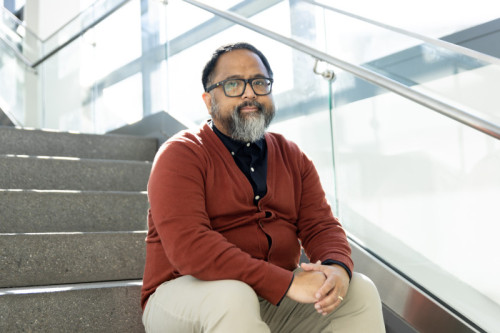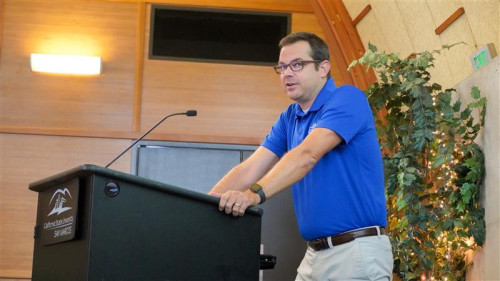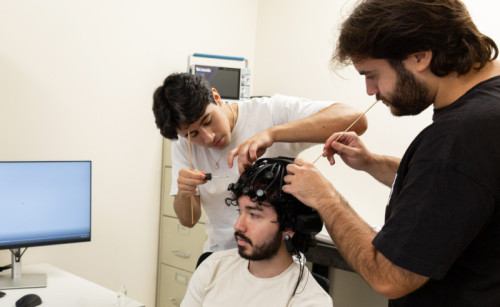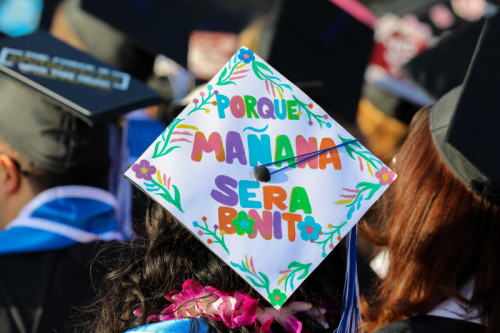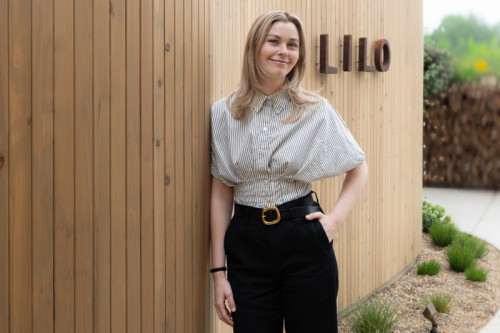Alumna on Front Lines of Fight to Advance Clean Energy
Manal Yamout McDermid often feels like sheâs standing on the cutting edge of Californiaâs multibillion-dollar green economy.
One day, McDermid will be meeting with a company that is developing what are effectively electric helicopters designed to cover distances of less than 100 miles â basically, an Uber for the skies. The next day, sheâll sit down with a business thatâs building a device that captures a semi truckâs carbon emissions directly from the tailpipe, pumps it into a tank, then either buries it underground or sells the CO2 for use in products like soda.
Still other days might include huddles with firms that make rooftop solar panels, heat pump water heaters, even self-driving cars.
âEach of the clients that I work with, I get a chance to embed in their team,â McDermid said. âI get to jump around. And not only is the subject matter different, but the people are different and the vibe is different. I like that diversity.â
Those clients, in turn, value McDermidâs expertise, so much so that theyâre willing to pay handsomely for it, in many cases while theyâre still trying to get off the ground as a startup. The Cal State San Marcos alumna is the founding partner of Caliber Strategies, a Sacramento-based lobbying firm that helps energy and climate companies â whether sexy startups or stodgy utilities â navigate the regulatory maze that is the California policy arena.
In doing so, McDermid draws on almost two decades of experience in state politics and policymaking, going back to when she was a clean energy adviser to former Gov. Arnold Schwarzenegger in her early 20s, only a few years after graduating from CSUSM with a degree in biology.
âI founded this company because itâs really challenging to bring new technologies to market, especially in a place like California where the market rules are quite complex and there are all these different agencies doing different things,â McDermid said. âWe focus exclusively on climate and energy, and primarily on what I refer to as disruptive technologies.â
Founded in 2013, Caliber now totals eight employees, and one of McDermidâs fellow partners is Michael Picker, former president of the California Public Utilities Commission (CPUC), the nonpartisan body charged with regulating the stateâs utilities. The company has almost 50 clients, including investment management giant Blackstone, accounting firm KPMG and Sunrun, one of the nationâs biggest solar installers.
Sometimes Caliberâs clients take the form of a legacy company thatâs opening a new product line. A.O. Smith Corporation, for example, has been around for 150 years and is one of the worldâs leading manufacturers of water heaters and boilers, with annual sales of almost $4 billion. But as California increasingly moves toward the full electrification of all buildings, A.O. Smith is gravitating toward heat pumps, which heat water using electricity instead of gas.
Enter Caliber. The company worked with a team of nonprofit, industry and environmental organizations to help pass legislation to allocate about $44 million in incentives for heat pumps. Caliber then led an effort with this coalition and the CPUC to design an incentive program that would offer state residents payments of up to $7,300 for installing heat pumps.
Another category of clients is fledgling businesses with an innovative solution to a climate-related problem. Charm Industrial is a Bay Area startup with a mission to, as its website touts, âput oil back underground,â an elegantly simple description of the complex science involved in carbon capture and sequestration. Charm approached Caliber in its infancy, seeking to get introduced to the right people, increase its name recognition and create a market from scratch.
âItâs about streamlining the process, and even more so trying to educate regulators,â McDermid said. âWe educate regulators and policymakers about what the needs of new technologies are. After the policymaker has already said, for example, we want electric cars and you have the market ready, there remain all these barriers that no one has figured out. So itâs a collaborative process to figure out how we get from where we are now to where we want to be.â
It was at CSUSM where McDermid discovered her twin passions for environmental science and public policy. Having initially enrolled at the university on a cross country and track and field scholarship (she competed for two years before injuries forced her to stop), she decided she wanted to pursue conservation biology and save the earth one planted tree at a time.
At some point in her college journey, however, it dawned on her that planting trees â even 10 to 20 acres worth â couldnât compare with, say, protecting millions of acres through legislation. As a junior, McDermid spent the fall semester in Washington, D.C., as part of the Panetta Congressional Internship Program, and when she returned, she ran for and was elected president of Associated Students, Inc., for her senior year in 2004-05. She even started a progressive activist organization with some friends.
âCSUSM was this perfect testing ground to try out all these different things,â she said.
Using her student experience as a springboard, McDermid was accepted after graduation into the Capital Fellows Program, an initiative through Sacramento State that offers paid, full-time fellowships in each branch of Californiaâs government. She was assigned to Gov. Schwarzeneggerâs office for a year, followed by a year working in the office of First Lady Maria Shriver.
In 2008, McDermid got her big break when Susan Kennedy, still early in her tenure as Schwarzeneggerâs chief of staff, acted on a recommendation to tap McDermid as her top deputy. Kennedy was seeking not an executive assistant but someone who could step into her high-pressure position when necessary and not miss a beat. In McDermid, she found a kindred spirit, essentially a younger version of herself.
âShe was perfect,â Kennedy said. âShe looked out at the landscape from the perspective of, if she were the chief of staff to the governor, how would you prepare for this? How would you brief him on this? What information do you need from the agencies or the departments or the senior staff?
âItâs a very tough role to step into, and she earned everyoneâs respect because she was so good at what she did. She made me twice as good at what I was doing because she was as good as me.â
Near the end of his eight years as governor, Schwarzenegger began to feel a particular urgency to buttress his accomplishments in the climate space. He tasked Kennedy with figuring out how to secure permitting for a host of renewable energy projects being incentivized by the Obama administration, and Kennedy in turn tasked not only Picker â the former CPUC president and current Caliber partner â but also McDermid.
âIt was a failure-is-not-an-option initiative by the governor,â Kennedy said. âI gave Michael all the power, and I gave him the most powerful weapon I could think of, which was Manal. The two of them were responsible for basically unlocking gigawatts of renewable energy in California, which completely changed the landscape of the stateâs climate initiatives.â
McDermidâs efforts were so successful that, when Schwarzenegger left office in 2011 and Jerry Brown entered, she was among just a handful of staffers retained out of the nearly 100 in the governorâs office. She departed later that year to take a job in Washington as a lobbyist for NextEra Energy, an electric utility holding giant, before Kennedy lured her back to California in 2013.
With her longtime mentor, McDermid launched not only Caliber but also Advanced Microgrid Solutions (AMS), a company that was born out of the shuttering of the San Onofre nuclear power station in June 2013. That closure created an immediate 20% power shortage in large portions of Los Angeles, a gap that AMS filled by building what McDermid called the âworldâs largest virtual power plantâ â battery storage systems at commercial sites like Kaiser Permanente, Irvine Company and Walmart. Over time, AMS shifted its focus from developing those large-scale energy storage projects to providing software that allowed others to optimize their own energy storage assets.
When AMS was sold in 2020, McDermid rededicated herself to Caliber, which had been on the back burner for a few years. During the pandemic, she got married and moved from San Diego (where she grew up after her family escaped war-torn Lebanon when she was 3) to Santa Barbara, her husbandâs hometown. Manal and Hitch, her husband, have a 3-year-old son, Malek.
McDermid makes frequent trips to Sacramento and to San Francisco, where Caliber has a small office. Not coincidentally, the Bay Area also is the headquarters of the CPUC, one of the regulatory bodies that Caliber works closely with, along with the California Energy Commission, the Air Resources Board and the Natural Resources Agency.
Many for-profit companies have an adversarial relationship with the regulators that establish the rules governing them, but thatâs not the case with Caliber or most of its clients. Theyâre all in the same boat and rowing in the same direction when it comes to the stateâs ambitious climate goals, which is one of myriad reasons why McDermid loves the work she does.
âWeâre very focused in California precisely because we actually want to get things done,â McDermid said. âI donât want to spend my time convincing someone that climate change is a problem or that we should put more electric vehicles on the roads. The nice thing about California is, at the highest level, the leadership is completely bought in on what the problem is. And itâs more about figuring out: How do we solve it?â
Manal Yamout McDermid
Major at CSUSM: Biology
Graduation year: 2005
Company: Caliber Strategies
Website: caliberstrat.com
Founded: 2013
Number of employees: 8
Talking Business With Manal Yamout McDermid
What's the best advice you received about starting a business?
Work with people you like. It's super simple, but if you pick people you like and admire and want to spend an inordinate amount of time with, you really can't go wrong. In some ways, getting the people right is more important than the idea and the path to market.
What advice would you give budding entrepreneurs?
Same advice as the first one: Choose your partners carefully, and choose them based on their character, their integrity and your level of trust in them. Donât just think about breaking into a market.
What's the greatest challenge in starting your own business?
I think it's the uncertainty and the self-doubt that come with it, like: Should I grow? The greatest challenge is believing that as you scale up, things will work out, and getting the confidence to take that next step.
Knowing what you know now, is there anything you would have done differently?
No. I'm a firm believer that whatever happens was supposed to happen, and it doesn't mean that it was good. But I wouldn't have done it differently.
What are the qualities of a good entrepreneur?
I would say confidence, belief in yourself. The ability to really pay attention to what's happening around you, whether that's the market or the people you surround yourself with.
Media Contact
Brian Hiro, Communications Specialist
bhiro@csusm.edu | Office: 760-750-7306
Latest News Release
- Ethnic Studies Professor to Perform at San Diego Book FestivalJason Magabo Perez, a Cal State San Marcos associate professor of ethnic studies, will be a featured performer at the inaugural KPBS San Diego Book Festival this weekend. Perez, who’s also the poet laureate emeritus for the City of San Diego, will read some of his poetry on the main stage Saturday from 2:30-3 p.m. at the University of San Diego. He will appear alongside Paola Capo-Garcia, San Diego’s current poet laureate, and award-winning poet Karla Cordero. The festival, which runs from 10 a.m. to 4 p.m., is a free event featuring panel discussions with award-winning authors, activities, live entertainment and exhibitors including local authors and independent booksellers. Hired in 2019, Perez is entering his seventh academic year at CSUSM. In January 2023, San Diego Mayor Todd Gloria selected him as the city’s poet laureate, a two-year appointment to write poems, hold workshops and add to the cultural richness of the region. Also in 2023, Perez was awarded a $50,000 poet laureate fellowship by the Academy of American Poets. He helped launch a youth empowerment poetry project that included youth mentorship and workshops on poetry, performance-making, filmmaking and video art. Media Contact Brian Hiro, Communications Specialist bhiro@csusm.edu | Office: 760-750-7306
- Assistant Dean to Lead CSU Student Success Network BoardAdam Petersen, assistant dean of undergraduate studies at Cal State San Marcos, has been appointed chair of the Advisory Board for the CSU Student Success Network. There are student success efforts underway at every level in the CSU to support educational opportunities and close opportunity and outcome gaps, and the network offers forums for sustained, cross-campus, cross-role, evidence-based, professional learning opportunities. Petersen, who has served on the board since 2018, will help guide the network into its next phase. At CSUSM, he leads efforts to improve student retention and graduation, particularly for traditionally underserved groups, by overseeing academic support programs such as peer-led tutoring and developing systems to identify and assist students experiencing academic challenges. Petersen received his bachelor’s and master’s in political science from the University of San Diego and San Diego State, respectively, and earned his doctorate in educational leadership from the joint program at CSUSM and UC San Diego. Media Contact Eric Breier, Interim assistant director of editorial and external affairs ebreier@csusm.edu | Office: 760-750-7314
- Summer Scholars Project Fuses Engineering With NeuroscienceSoudeh Khoubrouy came to Cal State San Marcos two years ago with an unorthodox mix of expertise: a background in electrical engineering (in which she holds a Ph.D.) combined with a research interest in neuroscience (in which she has a master’s degree). Entering her third fall as an assistant professor of electrical engineering, Khoubrouy runs the Neural Signal Processing and Artificial Intelligence Research (NSPAIR) Lab, a small room in Academic Hall where she and a group of students work on projects fusing her two academic fields – using engineering skills to advance neuroscience applications. This summer, the NSPAIR team began a project that they hope could someday contribute to helping people with paralysis use brain signals to accomplish everyday tasks. As part of the long-running Summer Scholars Program on campus, the three students in Khoubrouy’s lab – Aleks Gonzalez, Moises Nelson and Manuel Villa-Hernandez – started modestly. They learned about the electroencephalogram (EEG) cap that Khoubrouy purchased through a Hispanic-Serving Institutions STEM grant during her first year at CSUSM. The EEG cap is worn over the head, where 32 electrodes connect to the scalp (non-invasively), measure brain signals and send them wirelessly to a computer. The students then learned how to interpret EEG signals and the type of software employed to process them. They discovered how eye blinking by the person wearing the cap can disrupt the signal and how to remove that interference. They also reviewed methods used for EEG-based brain-computer interfaces that will assist them in designing their human data collection and decoding the collected EEG signals. When the fall semester commences, the students will split into teams and continue the project as part of their capstones (all three are senior electrical engineering majors who are on track to graduate next May). Gonzalez and Nelson, joined by a third student, will work with the EEG cap – designing experiments for human subjects (mainly student volunteers), collecting data and applying machine learning and deep learning methods to decode the EEG signals. Villa-Hernandez, joined by two other students, will focus on the robotic arm – collaborating on the experiments for human subjects and designing an interface to allow the team to take brain signals from the cap and use them to control the robotic arm. Khoubrouy said the Summer Scholars students built on the efforts of previous students, who accelerated the training process by sharing their work and resources. But she also saluted the current students for diving headlong into a mostly unfamiliar discipline this summer. “They had to go outside their comfort zone, because the project was an interdisciplinary topic,” she said. “Before this, they were only focusing on electrical engineering, and this was more related to neuroscience. The literature that they studied is high-level papers written by scientists, Ph.D. students. I know it was really difficult for them to understand, and I was impressed by the progress they made.” Gonzalez is a two-time Summer Scholar in the NSPAIR Lab who has been mentored by Khoubrouy since his sophomore year. The first project he worked on involved training AI software to interpret brain waves and predict if the subject was responding to an audio or visual stimulus. The team next increased the complexity, presenting the subject only with a visual stimulus and trying to determine if it was a food or non-food image. “I've been able to see how the projects have grown from their simplest form to now moving to controlling a robotic arm, which has been cool,” Gonzalez said. The robotic arm features four joints and a gripper. This school year, the objective is to exert basic control – which joint to move and in what direction. In future years, Khoubrouy hopes to reduce the processing time to make it as close to instantaneous as possible. The ultimate goal of the multiyear project is to help people with paralysis to move prosthetic limbs or other devices using only their thoughts. “I know some labs have been working on it,” Khoubrouy said. “They have been very successful, but the goal is to make it more natural and faster and easier.” All three of the lab students are from the local area (though Villa-Hernandez was born in Ithaca, N.Y., where his father worked for Cornell University), and all three have caught the research bug to the extent that they intend to pursue a master’s or even doctorate in engineering. “It’s really nice to be given the opportunity to partake in undergrad research,” Gonzalez said. “That pushed me to want to go to graduate school.” For now, however, there are experiments to design, subjects to recruit – and a robotic arm to move. “It’s fun, it’s interesting,” Villa-Hernandez said of the project. “It’s learning new things that you’ve never seen before.” Media Contact Brian Hiro, Communications Specialist bhiro@csusm.edu | Office: 760-750-7306
- David T. and Dorris E. Staples Foundation Supports Art InternshipsA paintbrush, a stage, a story — the arts inspire innovation, evoke empathy and spark thoughtful conversations. Now, thanks to a generous three-year investment from the David T. and Dorris E. Staples Foundation, Cal State San Marcos students are turning creative passions into career pathways through paid academic internships. In partnership with CCAE Theatricals, CSUSM’s College of Humanities, Arts, Behavioral and Social Sciences (CHABSS) launched Pathways to Purpose, a career readiness program that provides structured, paid internships for students in arts education and theater arts. Future educators gain experience designing curriculum and teaching in Escondido elementary schools, while theater students gain an introduction to administration, performance opportunities, and invaluable production experience through set design, prop creation and behind-the-scenes work on live performances. “While there are clear career paths in fields like nursing or business, the pathway for liberal arts students may not seem as obvious at first glance,” CHABSS Dean Liora Gubkin said. “For our students, especially those who are first-generation, paid internships open doors to opportunities that might otherwise be out of reach.” More than half of CSUSM students are the first in their families to attend college, often balancing academics with multiple jobs. For liberal arts students, especially those drawn to nonprofit and public-sector work, most internships are unpaid. Pathways to Purpose helps level the playing field by reducing financial barriers and offering real-world experience. Research shows that students who complete internships are more likely to graduate on time, secure employment and earn higher wages. And with eight out of 10 CSUSM graduates staying local, the program also strengthens the region’s cultural and educational landscape. “We’re proud to support CSUSM’s Pathways to Purpose program, which reflects the university’s commitment to student success,” said Joe Bowe, president of the David T. & Dorris E. Staples Foundation. “By combining paid internships, mentorship and career skills training, the program prepares students for meaningful careers in the arts and education while strengthening the local workforce.” The Staples Foundation’s support builds on a longstanding relationship with CSUSM. Over the years, the foundation has contributed nearly $500,000 to programs such as the Alliance to Accelerate Excellence in Education, the ASI Cougar Pantry, the School of Education and the university’s All-Steinway School designation — a tribute to co-founder Dorris Staples’ love of music. “We’re immensely grateful to the Staples Foundation and thrilled to collaborate with CSUSM,” said Julianna Crespo, executive director at CCAE Theatricals. “The arts are essential to building vibrant communities. Partnering with CSUSM to provide students with real-world experience ensures the next generation of artists and educators can thrive and make a lasting impact.” With Pathways to Purpose, the Staples Foundation is helping shape the future of the arts at CSUSM, providing students with the resources they need to transform their passions into purpose-driven careers that will benefit our region for years to come. “Our vision is to expand this program across all liberal arts disciplines, giving every student a chance to apply their education in real-world settings,” Gubkin said. Media Contact Eric Breier, Interim Assistant Director of Editorial and External Affairs ebreier@csusm.edu | Office: 760-750-7314
- CSUSM Foundation Board Welcomes New Chairs, Three New DirectorsThe Cal State San Marcos Foundation Board is pleased to welcome two directors into new leadership roles and three new directors for the new academic year. Simon Kuo, vice president of corporate quality at Viasat, is the board’s new chairperson. Kristin Crellin, senior vice president of community and membership development at SchoolsFirst Federal Credit Union, is the vice chair. A longtime supporter of CSUSM, Kuo played a pivotal role in establishing the university’s electrical and software engineering programs and was instrumental in securing funds for the new Integrated Science and Engineering Building. Before joining the Foundation Board, he served on the advisory board of CSUSM’s College of Science and Mathematics (now College of Science, Technology, Engineering and Mathematics). In 2023, CSUSM recognized Kuo for his contributions to campus and the local community by awarding him an honorary Doctor of Science degree. Crellin is a respected leader in education advocacy and community engagement across California. With more than 35 years at SchoolsFirst Federal Credit Union, she has forged deep partnerships with school districts, universities and community organizations. She serves as chairperson of the CSU Foundation Board of Governors, representing all 22 campuses. “Simon and Kristin have been tremendous supporters of CSUSM over the years, and we’re thrilled to have them leading the Foundation Board,” CSUSM President Ellen Neufeldt said. “With Simon’s unwavering commitment to STEM innovation and Kristin’s deep roots in education advocacy, their leadership will be instrumental in shaping the future of CSUSM and ensuring that our students and region thrive for generations to come.” In addition, the Foundation Board’s three new directors are: Carol Lazier Lazier is philanthropist who’s a longtime champion of CSUSM and advocate for social mobility. Besides participating on CSUSM’s Campaign Committee as an ad hoc director, she has served on numerous nonprofit boards. She is best known for leading the effort to rebuild the San Diego Opera, which was on the brink of closure in 2014. Lazier was named San Diego Philanthropist of the Year in 2016. In recognition of her community impact, CSUSM awarded her an honorary Doctor of Humane Letters degree in 2022. Richard Armenta, Ph.D. The faculty representative, Armenta is a social epidemiologist and associate professor of kinesiology. He also serves as associate director of CSUSM’s Center for Training, Research and Educational Excellence (CTREE), supporting STEM education and student success. Mitch Kuvinka (’24, ’26) The student representative, Kuvinka is a Navy veteran and graduate student pursuing a master’s degree in history. He serves as a teaching assistant and works at the Epstein Family Veterans Center on campus. He is also a member of the President’s Inclusive Excellence Advisory Council and the History Club. “I’m pleased to welcome Carol, Richard and Mitch,” Neufeldt said. “The combination of a philanthropist, faculty member and graduate student brings a powerful mix of perspectives that will enrich the work of the Foundation Board.” About the CSUSM Foundation Board The CSUSM Foundation Board is composed of community leaders and philanthropists who cultivate and encourage charitable investment in the university, build meaningful regional relationships and encourage a culture of philanthropy. All gifts to the university are accepted and administered by the Cal State San Marcos Foundation, an official 501(c)(3) auxiliary organization of CSUSM.
- Career Twist: Alumna's Path from Kinesiology to Hospitality SuccessWhen Rachel Debber toured Cal State San Marcos as a high school student from Fresno, she wasn’t sure what her college experience would hold. What she found was a close-knit campus community, opportunities to grow as a leader and the unexpected start of a career she hadn’t planned. Debber graduated from CSUSM in 2016 with a degree in kinesiology. Today, she leads the team at Lilo, a 22-seat fine-dining restaurant known for its immersive tasting experience and coastal cuisine. Just 10 weeks after opening, the restaurant earned a prestigious Michelin star. “I didn’t even know hospitality could be a real career when I started,” Debber said. “But I quickly fell in love with it. That passion and the people I’ve met through this industry have made all the difference.” Debber planned to major in nursing at CSUSM, but after not being admitted into the highly competitive program, she shifted to kinesiology and fully embraced the opportunities the university offered. She spent four years on CSUSM’s women’s club lacrosse team, a sport she’d never played before college, and served on the campus orientation team. She said those experiences shaped her into the leader she is today. “I didn’t like not being good at something, so I worked hard at lacrosse,” Debber said. “That same hunger carried into management. I wanted to be better, and I was willing to put in the work.” Orientation team training helped her connect with people from all walks of life, a skill that now serves her well in the hospitality industry. “We spent a lot of time learning about different communities on campus and how to support them,” Debber said. “That still sticks with me. Now I manage a diverse team, and that kind of awareness is essential. I received good training from being on the orientation team. They would bring in a lot of different leaders on campus to teach you about their area, and that was beneficial.” After graduation, Debber faced a decision: return home to Fresno to save up for grad school or stay in San Diego and work. She chose to stay and unknowingly launched a career in hospitality. “My initial entry into hospitality was with the intention of going back to school for kinesiology or for health science,” Debber said. “But I decided that I really had a knack for hospitality. I didn't even know that that was a career option.” Her first role was as a host at Campfire in Carlsbad, where she helped open the restaurant in 2016. She worked her way up through various roles, eventually helping to open Jeune et Jolie as a bartender and rising to general manager. “I think a lot of people really struggled when I first started working in hospitality,” Debber said. “I had a lot of people telling me it's not really a sustainable career. I felt like I had a lot of societal pressure to move into a different direction.” However, Debber found a sense of purpose and community working in the restaurant industry. Now as general manager of a Michelin-starred restaurant at Lilo, she’s focused less on accolades and more on people. “I think the Michelin star is just a byproduct of all the hard work we put in,” Debber said. “What’s most important to me is that we’re providing a unique experience for people, that our books are full every night, and that our team is genuinely happy with what they do. “As a company, we really believe in making sure everyone’s time is well spent. That’s something I care deeply about in my role. So, for me, it’s less about the Michelin star and more about creating something meaningful.” Debber never could have predicted becoming the general manager of one of the most talked about restaurants in Southern California. But she credits every twist and turn along the way for helping her grow into the leader she is today. “I think the best things in my life have come from saying yes to something that scared me a little,” Debber said. “You don’t always have to know exactly where you’re going. Just be open, work hard and trust that it’ll lead somewhere great.” Media Contact Eric Breier, Interim Assistant Director of Editorial and External Affairs ebreier@csusm.edu | Office: 760-750-7314








